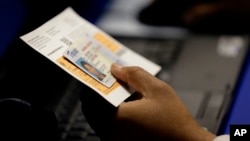A federal court is scheduled to hear a legal challenge to North Carolina’s Voter ID law on Monday. The law, H.B. 589, enacted in August 2013 shortens the early voting period by one week, eliminates same day registration, requires specific forms of identification to vote, and cancels a pre-registration program for 16 and 17-year-olds.
One must be 18 years old to vote in the United States.
Restrictive voter laws have been a controversial issue for the last two presidential elections. More than 32 states have voter ID laws or restrictive measures of some form. North Carolina is scheduled to join them in 2016.
All of the new measures have been introduced and implemented by Republican-led state legislatures and governors. Supporters say the laws are necessary to battle fraud and build confidence in the electoral process.
Critics argue the laws disproportionately discourage minorities, the poor, senior citizens and young people – those who are more likely to vote Democratic – from voting.
“The right to vote is supposed to be constitutional, not confusing,“ said the Rev. Dr. William Barber, president of the North Carolina chapter of the National Association For the Advancement of Colored People. “North Carolina’s restrictive Voter ID law remains an immoral and unconstitutional burden on voters and creates two unequal tiers of voters.”
The North Carolina law faced its first legal challenge in July of 2015. Fearing the law would not hold up in court, the legislature quickly passed a modification watering down the voter ID provision several weeks before the trial. The court postponed a ruling on the voter ID portion of the law to allow further review, but proceeded regarding the other provisions, which were upheld. The court will hear arguments on the voter ID requirement next week.
Voter ID laws have sparked legal battles in states across the country. A similar law in Wisconsin - one of the most restrictive measures in the country - was championed by Republican Governor Scott Walker. A four-year legal battle that ensued ended when the Supreme Court refused to hear the case last year. The law will be implemented for the 2016 election.
Walker often referred to the law during his failed 2016 presidential campaign and it became one of his biggest applause lines. He called it “a common sense reform that protects the integrity of our voting process.”
Critics like University of Wisconsin political science professor David Canon say the laws will not achieve their intended goal.
“You look at places where fraud is most likely to happen; it would be in areas like former felons voting when they shouldn’t be able to or non-citizens voting when they shouldn’t be able to," he said. "And a voter ID doesn’t prevent that type of fraud.”
Despite the criticism, Republicans in Wisconsin and other states have stood firm. Republican Milwaukee County Election Commissioner Rick Baas told VOA, “There is the narrative out there that Republicans are trying to suppress [the vote]. I guarantee you that all of the Republicans I know in leadership, all the Republicans I know in the rank-and-file in my caucus, as long as you are American, they want you to vote.”
No one knows what the impact will be of restrictive voter laws. Activists and grassroots organizations in affected states are scrambling to ensure that everyone who has the legal right to do so can vote. The 2016 election will be the big test case.
Monday’s court case in Winston-Salem, North Carolina is expected to last four to seven days and feature testimony from a range of experts and impacted voters.











